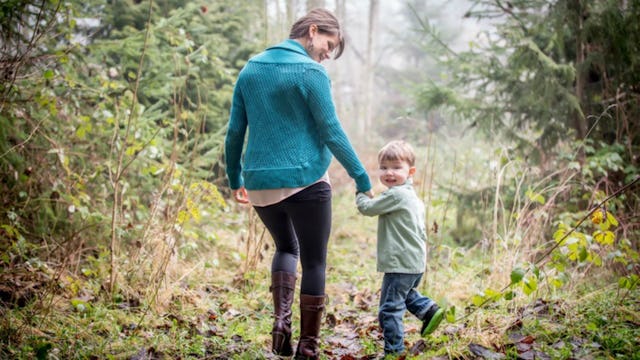Doctors Are Prescribing Walks To The Park As Part Of An Anxiety Treatment Plan

Ever since I was diagnosed with anxiety and panic disorder as a teen, I have been taking almost daily walks. It’s my therapy. Walking isn’t the only thing I’ve used over the years to help manage my anxiety, but it tops the list. With every step, my worries and fears start to fall off of me—and let’s not forget the magic of a little fresh air and a healthy dose of endorphins.
I know I’m not the only one who is familiar with the power of a nice walk outside, and now doctors are beginning to recognize this too. They are calling it “ecotherapy,” and are actually writing people prescriptions for it. Seriously: they are literally taking out their perception pads, writing, “Take a walk to the park for 30 minutes a day,” and handing this off to their patients.
Now, anyone who has dealt with a serious case of anxiety or other mental health issue will tell you that it’s not as simple as “just take a walk, and you’ll feel better.” To some, saying something like that might sound dismissive or insulting, like responding with “cheer up” to someone with depression. (PSA: please don’t say this.) But ecotherapy doesn’t exclude the possibility of using other traditional tools like therapy and medication; those can be used in tandem with it.
Ecotherapy can be one part of a more comprehensive, individual plan for wellness–one that isn’t emphasized as much as it probably should be. And anyone who has experienced the immense benefits of a walk in good old Mother Nature will tell you that it’s about time someone recognized how very healing it can be.
Take Lauren Huddle, for example. “I have pretty bad anxiety and depression,” Huddle tells NBC News. “And I don’t do well with pharmaceuticals, so my husband Nate would actually tell me all the time, ‘just go outside, you’ll feel so much better.’”
As Huddle explains in an NBC News video, her anxiety and depression were taking a toll on her entire family, including her nine-year-old son. So the Huddle’s family doctor, Dr. Gregory Anderson, wrote them a prescription that read: “Five times a week… spend 30 minutes at a park near your home.”
And that’s just what Huddle and her family did, with fantastic results. Huddle explains that she started to see improvements soon after she began her daily walks. “Just going out there, little bit by little bit, I noticed my temperament was better and my anxiety started to greatly decrease,” she shares.
But ecotherapy isn’t just useful for anxiety sufferers. Proponents of ecotherapy say that it can help treat depression and ADHD, as well as physical ailments like diabetes and high blood pressure.
Dr. Robert Zarr, a pediatrician from Washington, DC, is a champion for the cause, and started his own non-profit called Park RX America to spread the word about ecotherapy to physicians in his area and beyond. The mission of Park RX America is simple: “[T]o decrease the burden of chronic disease, increase health and happiness, and foster environmental stewardship, by virtue of prescribing Nature during the routine delivery of healthcare.”
Pretty interesting, right?
Physicians can consult Dr. Zarr’s database for local parks to send their patients to after their ecotherapy prescriptions are written. Park RX America coordinates with managers of public lands, as well as over 50 doctors in 11 states to get their message out about the healing powers of a daily walking practice, according to NBC News.
“We work with the doctors, nurses, and health care providers around the country and show them why it’s so relevant to prescribe parks and how easy it is to do, so that they can make it a part of their daily routine,” Dr. Zarr says.
And to be clear, it’s not just about exercise. Going to the gym alone won’t cut it, according to Dr. Zarr. He tells NBC News that studies have shown moving outdoors to have more therapeutic results than moving indoors. “We write prescriptions for all kinds of medicines. In addition to that, we’re starting to see nature and parks, not just as a place to recreate, but literally as a place to heal yourself,” Zarr says.
It’s not just good for grown-ups, either. Moving outdoors is vital for kids, too, especially if they are showing signs of anxiety, depression, and ADHD. And with the proliferation of screens and sedentary life-styles, getting out and moving is essential these days.
Dr. Zarr says that spending a few minutes staring at things like leaves and trees may also be good for children’s vision after having their eyes glued to screens for a million hours a day. Who knew?
Again, none of this means that other traditional methods like therapy and prescription medications are not warranted. It’s not one or the other, really. Every little thing you do to combat your anxiety or depression is helpful—and we all need to make these things a priority in our lives.
But I think we could all use a refresher about how something as simple as a walk through the park can work wonders for our bodies and souls. Plus, it costs nothing and is as easy as putting your shoes on and walking out the door. And it’s totally awesome (and about time) that doctors have got on board with this too.